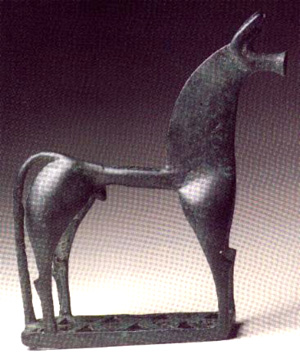In ancient times, a votive offering was considered to be a gift to a god. It was believed that anything dedicated by a mortal became property of a god, which was retained within the god’s temenos (sacred wall established around the perimeter of a sanctuary) and became a votive offering (Whitley, 140). This type of giving, particularly in ancient Greek society, was not based completely on private devotion, but it was an extremely public act that demanded some form of public recognition.
Votive offerings were not always small objects, on the contrary, archaeological and literary evidence suggest that even whole ships captured in battle from the enemy fleet were later dedicated by the victors as an offering of thanks to the god. Treasuries such as the Siphnian treasury at Delphi and bronze statues were erected to celebrate victories in panhellenic games. Every object found within a sanctuary's temenos was not an offering to the god. Things like equipment were also kept within the sanctuary, these items included: libation vessels that were used by the cult.
Since the Archaic period votive offerings were usually inscribed with the dedicator’s name. Archaeologists believe that from the ninth century onwards, the quantity and range of votive objects found at sanctuaries increased, particularly Bronze objects. There are substantially more dress pins and tripods (as mentioned in Homer, in which these objects were given as prizes in funeral games) during this time.
Whitley, James. The Archeology of Ancient Greece. United Kingdom: Cambridge University Press, 2001.

Archaic Bronze Horse
Posted at Dec 11/2007 08:59PM:
keffie: I like how you address both the private devotional nature and the aspect of public competition and consumption in the act of votive offering. You bring out this distinction effectively in the examples you use.
